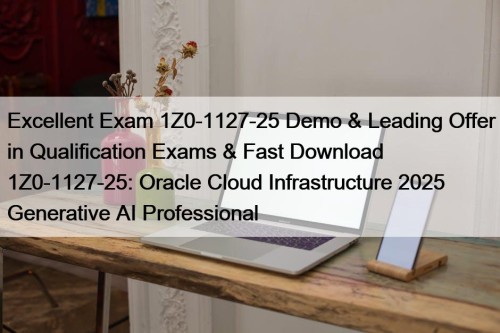Most Popular
 Excellent Exam 1Z0-1127-25 Demo & Leading Offer in Qualification Exams & Fast Download 1Z0-1127-25: Oracle Cloud Infrastructure 2025 Generative AI Professional
Excellent Exam 1Z0-1127-25 Demo & Leading Offer in Qualification Exams & Fast Download 1Z0-1127-25: Oracle Cloud Infrastructure 2025 Generative AI Professional
We have prepared our Oracle 1Z0-1127-25 Training Materials for you. ...
 CFR-410 New Study Notes | Latest CFR-410 Learning Material
CFR-410 New Study Notes | Latest CFR-410 Learning Material
BONUS!!! Download part of Pass4sureCert CFR-410 dumps for free: https://drive.google.com/open?id=1A7QugfIFWFd4zsHx8KHhj5ahGhRcY6n-To ...
 Quiz Fantastic AD0-E560 - Adobe Marketo Engage Architect Master Exam Details
Quiz Fantastic AD0-E560 - Adobe Marketo Engage Architect Master Exam Details
P.S. Free & New AD0-E560 dumps are available on Google ...



Pass Guaranteed Quiz 2025 HashiCorp HCVA0-003: Efficient Authorized HashiCorp Certified: Vault Associate (003)Exam Test Dumps

Our HCVA0-003 exam questions are compiled by experts and approved by the professionals with years of experiences. The language is easy to be understood which makes any learners have no obstacles and our HCVA0-003 guide torrent is suitable for anyone. The content is easy to be mastered and has simplified the important information. Our HCVA0-003 test torrents convey more important information with less questions and answers and thus make the learning relaxing and efficient. With our HCVA0-003 exam questions, your will pass the HCVA0-003 exam with ease.
HashiCorp HCVA0-003 Exam Syllabus Topics:
| Topic | Details |
|---|---|
| Topic 1 |
|
| Topic 2 |
|
| Topic 3 |
|
| Topic 4 |
|
>> Authorized HCVA0-003 Test Dumps <<
HashiCorp HCVA0-003 Quiz - HCVA0-003 Valid Test Objectives
VerifiedDumps is the leading position in this field and famous for high pass rate of the HCVA0-003 learning guide. If you are headache about your qualification exams, our HCVA0-003 learning guide materials will be a great savior for you. Now it is your opportunity that we provide the best valid and professional HCVA0-003 Study Guide materials which have 100% pass rate. If you really want to clear exam and gain success one time, choosing us will be the wise thing for you. If you hesitate about us please pay attention on below about our satisfying service and high-quality HCVA0-003 guide torrent.
HashiCorp Certified: Vault Associate (003)Exam Sample Questions (Q18-Q23):
NEW QUESTION # 18
Which of the following is true about the token authentication method in Vault? (Select three)
- A. Tokens cannot be used directly; they must be used in conjunction with one of Vault's many auth methods
- B. The token auth method is used as the first method of authentication for Vault for a newly initialized Vault node/cluster
- C. The token auth method is automatically enabled in Vault and cannot be disabled
- D. External authentication mechanisms, such as GitHub, are used to dynamically create tokens
Answer: B,C,D
Explanation:
Comprehensive and Detailed In-Depth Explanation:
The token auth method is foundational to Vault. The Vault documentation states:
"Tokens are the core method for authentication within Vault. It is also the only auth method that cannot be disabled. If you've gone through the getting started guide, you probably noticed that vault server -dev (or vault operator init for a non-dev server) outputs an initial 'root token.' This is the first method of authentication for Vault. All external authentication mechanisms, such as GitHub, mapdown to dynamically created tokens."
-Vault Concepts: Tokens
* A,B,C: Correct per the above.
* D: Incorrect; tokens can be used directly:
"Tokens can be used directly or auth methods can be used to dynamically generate tokens based on external identities."
-Vault Concepts: Tokens
References:
Vault Concepts: Tokens
NEW QUESTION # 19
Which of the following are considered benefits of using policies in Vault? (Select three)
- A. Policies are assigned to a token on a 1:1 basis to eliminate conflicting policies
- B. Policies provide Vault operators with role-based access control
- C. Provides granular access control to paths within Vault
- D. Policies have an implicit deny, meaning that policies are deny by default
Answer: B,C,D
Explanation:
Comprehensive and Detailed In-Depth Explanation:
Vault policies offer several benefits for access control. The Vault documentation states:
"There are many benefits to using Vault policies, including:
* Provides granular access control to paths within Vault to control who can access certain paths inside Vault
* Policies have an implicit deny, meaning that policies are deny by default - no policy means no authorization
* Policies provide Vault operators with role-based access control so you can ensure users only have access to the paths required"-Vault Tutorials: Policies
* B: Correct. Granular control is a core feature.
* C: Correct. Implicit deny enhances security:
"Policies in Vault follow the principle of least privilege by having an implicit deny."
-Vault Policies
* D: Correct. Role-based access simplifies management.
* A: Incorrect; tokens can have multiple policies:
"Policies are indeed attached to tokens, but tokens can be assigned more than one policy if needed. Policies are cumulative and capabilities are additive."
-Vault Tutorials: Policies
References:
Vault Tutorials: Policies
Vault Policies
NEW QUESTION # 20
Mike's Cereal Shack uses Vault to encrypt customer data to ensure it is always stored securely. They are developing a new application integration to send new customer data to be encrypted using the following API request:
text
CollapseWrapCopy
$ curl
--header "X-Vault-Token: hvs.sf4vj1rFV5PvQSV3M9dcv832brxQFsfbXA"
--request POST
--data @data.json
https://vault.mcshack.com:8200/v1/transit/encrypt/customer-data
What would be contained within the data.json file?
- A. Transit secrets engine configuration file
- B. The encryption key to be used for encrypting the data
- C. Cleartext customer data to be encrypted
- D. Ciphertext to be decrypted
Answer: C
Explanation:
Comprehensive and Detailed in Depth Explanation:
The data.json file in this API request contains the data to be encrypted by the Transit secrets engine. The HashiCorp Vault documentation states: "When executing any call to the Vault API, data can be sent using an external file as shown above. In this case, the contents of the file would be cleartext customer data that needs to be encrypted by the transit secrets engine." Specifically, for the /transit/encrypt/ endpoint, it explains: "The API expects a JSON payload with a plaintext field containing the base64-encoded data to encrypt." The documentation elaborates under "Encrypt Data": "The request body must include the plaintext parameter, which is the base64-encoded version of the data you want to encrypt. For example: {"plaintext": "base64- encoded-data"}." Here,D (Cleartext customer data to be encrypted)fits this requirement-customer data in cleartext, base64-encoded, sent for encryption.A (Transit config)is managed in Vault, not sent.B (Ciphertext) is the output, not input.C (Encryption key)is stored in Vault, not provided by the client. Thus, D is correct.
Reference:
HashiCorp Vault Documentation - Transit API: Encrypt Data
NEW QUESTION # 21
As a best practice, the root token should be stored in which of the following ways?
- A. Should be stored in configuration automation tooling
- B. Should be stored in another password safe
- C. Should be revoked and never stored after initial setup
- D. Should be stored in Vault
Answer: C
Explanation:
The root token is the initial token created when initializing Vault. It has unlimited privileges and can perform any operation in Vault. As a best practice, the root token should be revoked and never stored after initial setup. This is because the root token is a single point of failure and a potential security risk if it is compromised or leaked. Instead of using the root token, Vault operators should create other tokens with appropriate policies and roles that allow them to perform their tasks. If a new root token is needed in an emergency, the vault operator generate-root command can be used to create one on-the-fly with the consent of a quorum of unseal key holders. References: Tokens | Vault | HashiCorp Developer, Generate root tokens using unseal keys | Vault | HashiCorp Developer
NEW QUESTION # 22
The following three policies exist in Vault. What do these policies allow an organization to do?
- A. Nothing, as the minimum permissions to perform useful tasks are not present
- B. Separates permissions allowed on actions associated with the transit secret engine
- C. Create a transit encryption key for encrypting, decrypting, and rewrapping encrypted data
- D. Encrypt, decrypt, and rewrap data using the transit engine all in one policy
Answer: D
Explanation:
The three policies that exist in Vault are:
* admins: This policy grants full access to all secrets and operations in Vault. It can be used by administrators or operators who need to manage all aspects of Vault.
* default: This policy grants access to all secrets and operations in Vault except for those that require specific policies. It can be used as a fallback policy when no other policy matches.
* transit: This policy grants access only to the transit secrets engine, which handles cryptographic functions on data in-transit. It can be used by applications or services that need to encrypt or decrypt data using Vault.
These policies allow an organization to perform useful tasks such as:
* Encrypting, decrypting, and rewrapping data using the transit engine all in one policy: This policy grants access to both the transit secrets engine and the default policy, which allows performing any operation on any secret in Vault.
* Creating a transit encryption key for encrypting, decrypting, and rewrapping encrypted data: This policy grants access only to the transit secrets engine and its associated keys, which are used for encrypting and decrypting data in transit using AES-GCM with a 256-bit AES key or other supported key types.
* Separating permissions allowed on actions associated with the transit secret engine: This policy grants access only to specific actions related to the transit secrets engine, such as creating keys or wrapping requests. It does not grant access to other operations or secrets in Vault.
NEW QUESTION # 23
......
You may urgently need to attend HCVA0-003 certificate exam and get the certificate to prove you are qualified for the job in some area. If you buy our HCVA0-003 study materials you will pass the test almost without any problems. Our HCVA0-003 study materials boost high passing rate and hit rate so that you needn't worry that you can't pass the test too much. We provide free tryout before the purchase. To further understand the merits and features of our HCVA0-003 Practice Engine you could look at the introduction of our product in detail.
HCVA0-003 Quiz: https://www.verifieddumps.com/HCVA0-003-valid-exam-braindumps.html
- HCVA0-003 Latest Examprep 🧨 HCVA0-003 Exam Dumps Demo 🍴 HCVA0-003 Free Download Pdf 🎅 Open website “ www.dumps4pdf.com ” and search for { HCVA0-003 } for free download 🦔Book HCVA0-003 Free
- HashiCorp Certified: Vault Associate (003)Exam Exam Simulations Pdf - HCVA0-003 Test Topics Examination - HashiCorp Certified: Vault Associate (003)Exam Vce Pdf 📟 Immediately open “ www.pdfvce.com ” and search for ➽ HCVA0-003 🢪 to obtain a free download ⏏HCVA0-003 Free Download Pdf
- HashiCorp - HCVA0-003 - High-quality Authorized HashiCorp Certified: Vault Associate (003)Exam Test Dumps 🐌 Search for ⮆ HCVA0-003 ⮄ and download it for free immediately on [ www.dumps4pdf.com ] 🚡100% HCVA0-003 Accuracy
- HCVA0-003 Exam Braindumps - HCVA0-003 Test Quiz - HCVA0-003 Practice Material 🐁 The page for free download of ✔ HCVA0-003 ️✔️ on ☀ www.pdfvce.com ️☀️ will open immediately 🔇HCVA0-003 Valid Dumps Book
- Free PDF HCVA0-003 - HashiCorp Certified: Vault Associate (003)Exam –The Best Authorized Test Dumps 🍶 Simply search for ▶ HCVA0-003 ◀ for free download on ⇛ www.pass4test.com ⇚ 🤧HCVA0-003 Exam Dumps Demo
- Pass Leader HCVA0-003 Dumps ⬅ HCVA0-003 Valid Dumps Book 🚦 New HCVA0-003 Dumps Book 🔤 The page for free download of ➥ HCVA0-003 🡄 on ⮆ www.pdfvce.com ⮄ will open immediately 📧Latest HCVA0-003 Test Cram
- HashiCorp - HCVA0-003 - High-quality Authorized HashiCorp Certified: Vault Associate (003)Exam Test Dumps ❗ ➤ www.dumpsquestion.com ⮘ is best website to obtain ( HCVA0-003 ) for free download 🔀HCVA0-003 Latest Examprep
- High-Quality Authorized HCVA0-003 Test Dumps - Fast Download HCVA0-003 Quiz: HashiCorp Certified: Vault Associate (003)Exam 👤 Open website { www.pdfvce.com } and search for ( HCVA0-003 ) for free download 💃HCVA0-003 Latest Examprep
- HashiCorp - HCVA0-003 - High-quality Authorized HashiCorp Certified: Vault Associate (003)Exam Test Dumps 🕛 Search for ( HCVA0-003 ) and easily obtain a free download on 《 www.pdfdumps.com 》 🌜HCVA0-003 Test Sample Online
- HCVA0-003 Pdf Braindumps 🍦 Pass Leader HCVA0-003 Dumps 👪 Valid HCVA0-003 Test Book 🚤 The page for free download of ➤ HCVA0-003 ⮘ on ➽ www.pdfvce.com 🢪 will open immediately 😬HCVA0-003 Positive Feedback
- Latest HCVA0-003 Study Materials 🤞 100% HCVA0-003 Accuracy 🔡 New HCVA0-003 Dumps Book 😅 Search for ☀ HCVA0-003 ️☀️ on 「 www.exams4collection.com 」 immediately to obtain a free download 📯HCVA0-003 Pdf Braindumps
- HCVA0-003 Exam Questions
- academy.aladaboi.com formationenlignemaroc.com pacificoutsourcinginstitute.com aviation.subirbanik.com wadoka.itexxiahosting.com shikshami.in tinnitusheal.com hcpedu.study kaloxacademy.com pt-ecourse.eurospeak.eu
Tags: Authorized HCVA0-003 Test Dumps, HCVA0-003 Quiz, HCVA0-003 Valid Test Objectives, New HCVA0-003 Dumps Ebook, HCVA0-003 Valid Real Exam